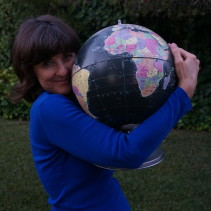

It was a breach birth, during which she had received no medical help. In the tradition of their tribe, the elders discussed killing the child at birth, to prevent future claims of paternity and inheritance against other families. But they decided to spare this baby for two reasons. First, the birth had coincided with rains that had ended a serious drought and was thus considered auspicious. Second, there was a belief that a baby who arrived feet first – and survived – would grow up to be a leader.
So the infant boy was allowed to live. They gave him a name that exemplified leadership: Kennedy. But they saddled him with a middle name, Owiti, which meant “unwanted.”
The boy grew up in that slum, the size of New York’s Central Park, population of over 1.5 million. There were no roads, schools, health care, clean water or sanitation. It’s a place where one in five children did not live to see their 5th birthday. A place where two-thirds of girls – as early as age six – traded sex for food.
Kennedy lived in a 10-by-10 shanty, the eldest of eight. He never went to school, but instead was selling peanuts on the streets at age 7 to help feed his family. He watched his mother suffer at the hands of an abusive father. His sister was pregnant at 16. Many of his friends resorted to lives of crime and prostitution.
In 2004, with only 20 cents in his pocket, he purchased a soccer ball, hoping to distract his friends from their hunger and despair. The response was astonishing. He started a theater program which grew into a grassroots movement offering information about health/HIV education, gender violence, and other issues.
Kennedy Odede eventually escaped that slum, securing a scholarship to study in the U.S. “Getting out of Kibera is a feat that few even dare to dream,” he explained. But he got out.
And then he went back.
His is a fairytale rags-to-riches story. He got the girl (an American grad student). He got the accolades (Forbes’ 30-Under-30 Social Entrepreneurs). He got the money ($10,000 from 100 Projects for Peace).
I sometimes get the question, “How do you deal with the poverty in the third-world countries you visit?”
It’s a good question. In order to answer it, I have to go back to my first international travel experience – fresh out of college at age 23 – to one of the poorest places in the world: Manila. Coming from modest midwest roots, I was appalled to see how people lived – crowded together in tiny, squalid shacks – living in dirt (which turned to mud during frequent rains). No proper sanitation, water or sewage systems. Open-air markets. Flies and filth. Chaos and crowding. Although I stayed in decent accommodations, I learned the “Asian squat” and the art of bucket baths. I met a Philippine girl, years younger than me, who was “indentured” to a wealthy couple because her impoverished parents owed money to the couple and supported the arrangement.
Despite it all, to my great surprise, people seemed happy. Maybe they complained among themselves, but I expected to notice victimization. And hopelessness. I expected them to be conspicuously envious of my relative prosperity. “Happy” is probably the wrong word, but they seemed content. Obviously, someone with low expectations can be content with whatever they have, or – in this case – what they have not.
And so, in the late 70s, over the course of my 8-month adventure through what was then called the Third World, I developed an appreciation for “impoverished” places and poor people.

That’s me in a Philippine rice paddy, circa 1978 – my first international travel experience. Changed my life in oh, so many ways!
Fast forward to a sunny August morning in 2012, as I walked with several of my WOW travelers through the Kibera slum – Africa’s largest. People went about their business and paid little attention to us. Many were smiling or laughing or singing. They didn’t look emaciated or unhappy. It was difficult to imagine the horrors of a contested presidential election that triggered tribal violence between the Luo and Kikuyu people just four years before. Thousands died or were injured. Entire neighborhoods of homes (hovels) were torched. Nobody looked particularly ruthless. How could these people have done that to each other?
Our destination was Shining Hope for Communities, which was founded by Kennedy Odede. Standing in the shade of a huge water tank, we learned how women and children previously would spend hours locating a vendor (often part of a water mafia), queuing up and balancing a 4-gallon jug of questionably clean water on their head. We were told that some Kibera residents pay more for water than wealthier Kenyans in suburban neighborhoods or even more than New Yorkers pay for water. Up to 20% of their income is spent on water!
But Kennedy’s water tank has helped to resolve one issue for one part of the slum called Kibera.
We next visited the tuition-free Kibera Girl’s School, where dozens of lively, bright, enthusiastic young girls were getting a free education. From a single soccer ball, the good has grown such that more than 30,000 people have been served by the employment center, health clinic and violence-against-women prevention programs that he started.

Visiting the Kibera School for Girls
Hope was all around us – if you looked for it.
And that’s the answer to the question about how I deal with the poverty. I focus on the hope – not the horror. I focus on the people who are finding solutions – like Kennedy Odede and the other 29 social entrepreneurs recognized in the Forbes article.
I will continue to lead travelers to these destinations so they can see, learn and appreciate our similarities and meet the people who are creating hope.
I don’t know if I’ll ever make a Forbes’ list (maybe there’s a “70-Under-70″ List?) but I fervently believe in the power of travel to educate, employ and empower people on all sides. One of my dreams is to start the WOW! Foundation. I’m not yet sure of its mission or exactly how it will work. But its components will include young people, travel, passion, and hope.
Comments? (always love ’em – please post in the box below!)
Copyright 2025 WOW! Travel. All Rights Reserved.
11 Comments
Patricia Andersson February 26, 2016 at 4:29pm
Kennedy Odede and his partner Jessica Posner have recently released a book about his/their story, called Find Me Unafraid: Love, Loss and Hope in a an African Slum. Well worth a read!
Julie Franz March 4, 2016 at 8:22am
I am very excited to hear about this book and anxious to read it. I was so impressed by the very well thought out and clearly successful projects going on in Kibera, and the Kibera Girls School was so full of joy and enthusiasm! It’s amazing what one person can do, no matter what his or her circumstances!
Cynthia Sawtell February 26, 2016 at 7:52pm
Oh, that beautiful Shining Hope girl’s school our Dining For Women donations helped build!
I am so glad that you are committed to leading travelers to have these experiences, and I look forward to many more trips with you, Marilyn.
Diane Lenkin February 27, 2016 at 1:15am
Visiting Kibera with you was life affirming. The optional “side” visit was eye opening personally and uplifting with regard to the resilience of human beings I saw what a difference can be made by dedicated caring people. Kennedy and Jessica have created a community of help and hope. Your WOW trips are inspirational and culturally educational. I applaud you for your vision.
Marilyn February 28, 2016 at 4:35pm
Thanks, Diane – such a special memory! Glad we shared it together!
Julie Franz March 4, 2016 at 8:28am
That visit was one of the many highlights on our wonderful trip to Kenya, and well worth getting up early for after our long flight. I agree with everything you said, Diane, and I believe the others would feel the same way.
Surinder Chinai February 26, 2016 at 6:22pm
Thank you, Marilyn! Loved the inspirational story this morning. If you ever need help with your foundation, please let me know! I would love to be a part of it!
Marilyn February 26, 2016 at 9:28pm
Thanks for your offer to assist with my Foundation!
Surinder Chinai February 27, 2016 at 8:21pm
Thank you!
Ron Murphy February 29, 2016 at 12:04am
Nice. You do such great work, sis!
Julie Franz March 4, 2016 at 8:36am
I loved this post, Marilyn, and am looking forward to all the wonderful things you will bring about through your WOW! Foundation. I think focusing on young people, travel, passion, and hope is a great idea. We have to get more and more people to learn that all those “others” are not scary or evil or whatever else some of their fearful or biased elders have led them to believe — and they can help spread the word through social media. Actually visiting places outside our country and interacting with the people provides much needed perspective and an understanding that we truly are more alike than different. Thanks again for all you do and all the wonderful trips I’ve been lucky enough to go on with you.